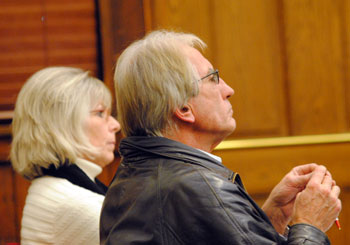Site Plan Moratorium: Commentary, No Action
Ann Arbor city council meeting (Feb. 19, 2013): Land use was the predominant theme of the meeting, linking several different agenda items – but the council chambers were filled mostly with people interested in just one of them.

The architecture of councilmember snacks at the Feb. 19, 2013 meeting provided a nutritional buffer against zoning out during the meeting: a stacked configuration of units for fruit and nuts. (Photos by the writer.)
The item drawing that interest was a proposed six-month moratorium on site plan review by the city for projects in the D1 (downtown core) zoning district. After holding a nearly one-hour closed session to review written legal advice from the city attorney’s office, the council decided to postpone the issue until March 4, its next regular meeting.
Exceptions to the proposed moratorium are provided for projects that have already received a recommendation of approval from the city’s planning commission. While that exception applies to a large residential project at 624 Church St., it does not exempt a larger project at 413 E. Huron. Planning staff had concluded that the East Huron project meets all the zoning requirements. But the planning commission’s vote on 413 E. Huron was only 5-3 in favor of recommending approval – one vote short of the six it needed. Ordinarily developers can, on their own initiative, bring a site plan to the city council for action, even without the planning commission’s recommendation.
If the resolution is enacted, then during the period of the moratorium, the planning commission would be directed to review the D1 zoning standards against site plans submitted since 2009, when new zoning regulations were established. The commission would be asked to make recommendations by June 4, its first meeting in June. The postponed resolution states that the council is supposed to take any action by Aug. 19, its second meeting in August.
Legal counsel for the 413 E. Huron developer addressed the council, intimating that if a moratorium were enacted, then a lawsuit would be filed against the city. Attorney Susan Friedlaender expressed skepticism about a provision in the postponed resolution that provided a way for an aggrieved party to have a hearing before the council. The council will take up the moratorium again on March 4.
Also postponed was a related resolution to reconvene the design guidelines task force, which would be asked to recommend improvements in the design review process. That resolution also will be taken up on March 4.
In another item related to downtown land development, the council completed an accounting step – establishing a project budget – in connection with roughly $9 million of bonds recently sold by the city. Those bonds are funding the public parking deck portion of the private City Apartments project now under construction at First and Washington. The Ann Arbor Downtown Development Authority will be making the bond payments.
Another land use issue postponed by the council was the proposed purchase of a parcel immediately adjacent to the Bluffs Nature Area. The postponement was based on council questions about the need for additional access from the west side of the nature area, and the price to be paid out of the city’s open space and parkland preservation millage. Related to that same millage, the council approved applying to the USDA Farm and Ranch Land Protection Program (FRPP) for matching funds to acquire development rights on two farms as part of the city’s greenbelt program.
In other land zoning issues, the council gave final approval to the owner-requested rezoning of some residential properties in the Arbor Hills neighborhood. The council also gave initial approval to a rezoning that would allow a retail project called The Shoppes to be built near the junction of Plymouth and US-23.
The council took action related to city-owned land at 721 N. Main, approving a $30,000 physical study of the main building on that former maintenance yard, to see if it can be re-used. At least part of that site is slated to become part of an Allen Creek greenway.
Across the street from 721 N. Main stands a collection of vacant houses that were supposed to be demolished to make way for the Near North affordable housing project. With that project now defunct, the city is moving to demolish the houses as nuisances. The council’s action on Feb. 19 was to accept about $96,000 in additional federal funds through a community development block grant, which can be used only for demolition of houses on the former Near North site.
In other action, the council formally adopted a sustainability framework that now will be part of the city’s master plan. And related to sustainability, the city council authorized the issuance of up to $1 million in bonds for the property assessed clean energy program (PACE). The PACE program provides low-interest loans for owners of commercial properties to invest in energy saving improvements.
Changes to the city’s living wage ordinance also were on the Feb. 19 agenda. The council had previously contemplated but ultimately postponed those changes. This time around, they were tabled. That means the issue will not come back, unless the council proactively decides to take up the proposal again in the next six months.
Also as a result of council action on Feb. 19, the municipal airport will get new fencing. [Full Story]




